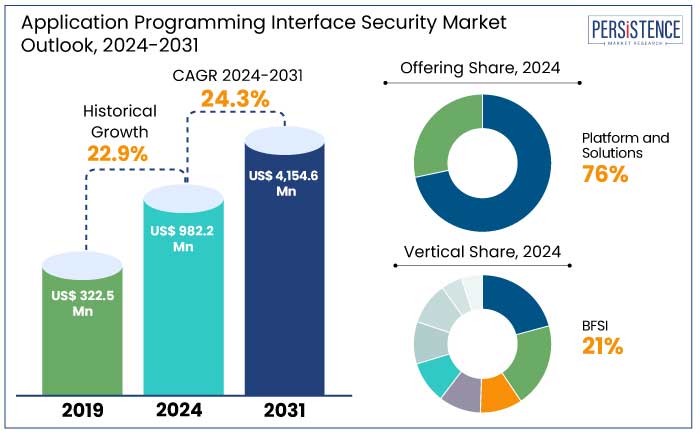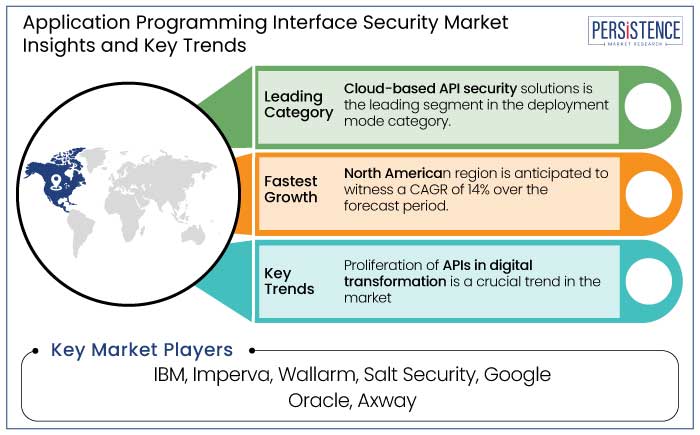Application Programming Interface Security Market
Industry: IT and Telecommunication
Published Date: December-2024
Format: PPT*, PDF, EXCEL
Delivery Timelines: Contact Sales
Number of Pages: 192
Report ID: PMRREP35021
The application programming interface security market is estimated to increase from US$ 982.2 Mn in 2024 to US$ 4154.6 Mn by 2031. The market is projected to record a CAGR of 24.3% during the forecast period from 2024 to 2031.
Rising API breaches has significantly impacted the Application Programming Interface (API) security industry, underscoring the critical need for robust security solutions. A substantial 60% of organizations have reported at least one API-related data breach in the past two years, with 74% experiencing three or more such incidents.
An overwhelming 95% of organizations have encountered security issues in their production APIs, with 23% having experienced a breach. It indicates widespread challenges in managing API security, leading to the increased demand for API security solutions.

Key Highlights of the Market
|
Market Attributes |
Key Insights |
|
Application Programming Interface Security Market Size (2024E) |
US$ 982.2 Mn |
|
Projected Market Value (2031F) |
US$ 4154.6 Mn |
|
Global Market Growth Rate (CAGR 2024 to 2031) |
24.3% |
|
Historical Market Growth Rate (CAGR 2019 to 2023) |
22.9% |
North America dominates the global application programming interface security market, driven by technological developments and a strong emphasis on cybersecurity. The region holds around 32% of the total market share globally, reflecting its technological leadership and widespread digital adoption.
The regional market is projected to experience a CAGR of 14% from 2024 to 2031. This indicates robust growth mainly driven by increasing cybersecurity concerns and rising demand for secure public and private APIs.
The region's unique technological infrastructure and early adoption of innovative solutions contribute significantly to market expansion. Stringent data protection regulations and compliance requirements necessitate robust API security measures, further propelling growth. The widespread shift toward digital platforms across various industries increases the reliance on APIs, amplifying the need for effective security solutions.
The continuous evolution of cyber threats and the growing complexity of digital ecosystems are making North America a leading hub. Organizations are set to invest heavily in novel security solutions to protect their digital assets and comply with regulatory standards, ensuring the market's upward trajectory in the next ten years.
Based on offering, the market is divided into platform and solutions and services. Among these two offerings, the platform and solutions segment dominates the market due to increasing need for comprehensive, scalable solutions that provide end-to-end protection for APIs. It is critical for modern application development and integration.
Organizations are increasingly adopting integrated API security platforms encompassing access control, encryption, threat detection, and monitoring tools, offering a holistic approach to API security. The trend is reflected in market analysis, with the platform and solutions segment accounting for the dominant market share of 76% in 2024.
Growing complexity of digital ecosystems and the proliferation of APIs across various industries necessitate robust security measures. These help protect sensitive data and ensure seamless integration between applications.
Comprehensive platforms and solutions address these challenges by providing centralized management and streamlined deployment. These help in enabling organizations to safeguard their APIs against evolving threats effectively. As businesses prioritize digital transformation and API utilization, demand for all-encompassing security solutions is set to drive the sustained dominance of the segment.
Based on vertical, the market is divided into BFSI, government, IT and telecom, manufacturing, retail and e-commerce, media and entertainment, healthcare, and energy and utilities. Out of these verticals, the BFSI segment dominates the market due to increasing reliance on APIs for delivering seamless financial services. The segment will likely hold a share of 21% in 2024.
The BFSI sector's rapid digital transformation and increasing reliance on APIs to deliver seamless financial services have raised the need for robust API security measures. Financial institutions utilize APIs to enable functionalities such as mobile banking, payment gateways, and open banking initiatives. These help facilitate data sharing with third-party providers.
While these APIs enhance customer experience and operational efficiency, they also extend the attack surface for potential cyber threats. Given the sensitive nature of financial data and stringent regulatory requirements, the BFSI sector prioritizes unique API security solutions to protect against data breaches, fraud, and unauthorized access.
Implementing comprehensive API security frameworks ensures compliance with regulations like the General Data Protection Regulation (GDPR) and the Payment Card Industry Data Security Standard (PCI DSS). As the BFSI sector continues to innovate and integrate digital services, the emphasis on securing APIs remains critical. This is further reinforcing its leading position in the global market.
API security protects application programming interfaces from cyber risks and guarantees data security shared among services, applications, and databases. APIs are essential for facilitating data integration and inter-system communication, making them vulnerable to cyberattacks if inadequately secured.
To alleviate these concerns, sophisticated Application Programming Interfaces (APIs) security solutions provide critical functionalities such as user authentication, data encryption, threat detection, and usage statistics. Such procedures mitigate data breaches, assure adherence to pertinent legislation, and enable the secure transmission of information.
Increasing dependence on cloud services and digital transformation is accelerating the implementation of stringent security procedures for APIs. It is especially evident in the Banking, Financial Services, Insurance (BFSI), and healthcare sectors. The necessity for improved API security is becoming increasingly vital as firms confront upgraded dangers in a more interconnected digital environment. For instance,

The application programming interface security market experienced substantial growth during the historical period from 2019 to 2023 at a CAGR of 22.9%. It was driven by rapid adoption of digital transformation initiatives, cloud computing, as well as the proliferation of APIs in critical industries such as BFSI, healthcare, and e-commerce.
Rising incidents of API-related breaches underscored the need for robust security solutions, prompting organizations to adopt comprehensive API protection frameworks. BFSI led the market due to stringent regulatory requirements and the sensitive nature of financial data.
The historical period also saw the emergence of open banking initiatives and mobile applications. These heavily relied on APIs for data integration and functionality, further fueling demand for API security solutions.
Over the forecast period, the market is anticipated to rise rapidly due to innovations in AI-driven threat detection and zero-trust architecture. Increasing reliance on APIs for mission-critical applications in edge computing and IoT ecosystems is another key factor boosting demand.
Emerging markets, particularly in Asia Pacific and Latin America, are anticipated to contribute significantly as these regions adopt digital technologies at scale. Government regulations and compliance standards are set to further drive the adoption of API security solutions, particularly in sectors like healthcare and public services.
Proliferation of APIs in Digital Transformation is a Key Driving Factor
The application programming interface security market is witnessing rapid growth due to the essential role of APIs in enabling digital transformation. These have become the backbone of modern technological ecosystems, facilitating seamless interaction between different applications, systems, and services.
Industries such as BFSI, healthcare, e-commerce, and telecommunications rely heavily on APIs to enhance operational efficiency, improve user experiences, and deliver innovative services. APIs enable real-time financial transactions, electronic medical record sharing, and e-commerce integrations like payment gateways and logistics tracking.
The widespread adoption of APIs has significantly increased the attack surface, making them prime targets for cyber threats. Cybercriminals exploit unsecured APIs to gain unauthorized access to sensitive data, disrupt operations, or inject malicious payloads. It has created an urgent need for API security solutions that provide functionalities like access control, encryption, and real-time monitoring.
Organizations now prioritize API security as a key component of their cybersecurity strategies, ensuring secure data sharing while leveraging the benefits of digital transformation. This trend is set to sustain market growth as businesses innovate with API-driven applications. For example,
Rising Cases of API Breaches Globally to Propel the Market Forward
API-related cyberattacks have surged in recent years, making security a top priority for organizations. APIs are often exploited due to their direct access to sensitive data and integration points within complex systems.
High-profile breaches, such as those in the BFSI and social media sectors, have highlighted the vulnerabilities in unsecured APIs. Poorly secured APIs in financial applications can lead to massive data thefts, causing financial losses and regulatory penalties. Such breaches compromise data integrity, erode customer trust, and damage organizational reputations.
A single API breach can expose millions of user credentials, leading to significant legal and financial repercussions. Organizations invest in novel API security solutions to incorporate features like AI-driven threat detection, usage analytics, and automated vulnerability patching. Regulatory frameworks like the General Data Protection Regulation (GDPR) and the California Consumer Privacy Act (CCPA) mandate stringent data protection measures, further driving adoption of API security.
Complexity in Securing APIs across Diverse Environments to Hamper Demand
One significant restraint for the application programming interface security market is the complexity of securing APIs deployed across diverse environments. These include on-premises systems, cloud infrastructures, and hybrid models.
Organizations often manage hundreds or thousands of APIs, each with unique specifications, endpoints, and integration points. APIs evolve continuously with updates and new functionalities, requiring real-time security adaptations to protect against vulnerabilities.
Tools and frameworks for API security often lack interoperability, complicating deployment in multi-cloud or hybrid setups. The said challenge increases operational costs and creates gaps in security, potentially exposing sensitive data to breaches. As API ecosystems grow in size and complexity, the difficulty of managing and securing them effectively poses a significant restraint on the market.
Proliferation of Open Banking and FinTech Applications Presents Key Opportunities
The rise of open banking and FinTech applications is one of the most transformative opportunities in the API security industry. Supported by regulations such as the EU’s PSD2 (Payment Services Directive 2) and similar frameworks in Asia Pacific and North America, open banking initiatives require banks to share customer financial data with authorized third-party providers via APIs.
It has paved the way for innovative financial services like digital wallets, personalized budgeting tools, and seamless peer-to-peer payment platforms. However, it has also introduced significant cybersecurity challenges.
APIs used in open banking are critical gateways to sensitive financial data, including account details, transaction histories, and user authentication credentials. Cybercriminals frequently target these APIs to exploit vulnerabilities for financial gain, data theft, or fraud. Financial institutions and FinTech companies are investing heavily in API security solutions to address these risks.
Key security measures, such as tokenization, dynamic authentication protocols, and real-time monitoring, are being deployed to safeguard open banking APIs. Tokenization replaces sensitive data with unique identifiers, ensuring secure transactions, while dynamic authentication adjusts access permissions based on real-time risk assessments.
Novel threat detection tools also identify suspicious behavior patterns and mitigate attacks before they escalate. In addition to mitigating risks, robust API security solutions enable compliance with stringent regulatory requirements like GDPR and PSD2, which mandate strong data protection measures.
As open banking extends globally and FinTech innovations reshape the industry, demand for API security tailored to financial applications is set to surge exponentially. This makes it a key opportunity for the API security sector. For instance,
The application programming interface security market is highly competitive and driven by the increasing reliance on APIs across industries. Key players such as Salt Security, Traceable AI, Noname Security, and Imperva dominate the market, offering comprehensive API protection solutions.
Key companies focus on new technologies like AI and machine learning for real-time threat detection and automated response. Small-scale players and start-ups target niche markets with innovative solutions tailored for specific industries such as BFSI, healthcare, and e-commerce.
Partnerships, mergers, and acquisitions are common strategies among market leaders to enhance their product offerings and extend their reach. Rising demand for solutions addressing emerging risks associated with open banking, IoT, and edge computing environments further shapes the landscape.
Recent Industry Developments
|
Attributes |
Details |
|
Forecast Period |
2024 to 2031 |
|
Historical Data Available for |
2019 to 2024 |
|
Market Analysis |
US$ Billion for Value |
|
Key Regions Covered |
|
|
Key Market Segments Covered |
|
|
Key Companies Profiled in the Report |
|
|
Report Coverage |
|
|
Customization and Pricing |
Available upon request |
By Offering
By Vertical
By Application
By Deployment Mode
By Region
To know more about delivery timeline for this report Contact Sales

It is the practice of preventing or mitigating attacks on APIs.
Apigee, Kong, MuleSoft, AWS API Gateway are some of the examples of API security.
It is a key for project authorization which helps identify the project or application that makes the call.
The market is set to reach a value of US$ 4.15 Bn in 2031.
SOAP API is considered to be the most secure API.